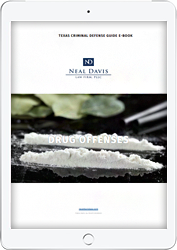When your rights are violated, one remedy is throwing out the evidence
If you’ve been charged with a drug crime or other criminal offense, then you’re in for the fight of your life. Your job, reputation and freedom are on the line, so every bit of evidence used against you should be closely examined by your defense attorney.
In some cases, evidence used by the prosecution may be suppressed or excluded from a trial because it was obtained illegally or unlawfully. This law is called “the exclusionary rule” and it can play a vital role in your case.
Continue reading to learn more about the exclusionary rule – including when it applies, how it originated, state and federal laws and more. To determine whether the exclusionary rule applies in your case, discuss your case your criminal defense attorney.
What is the Exclusionary Rule?
The United States Supreme Court firmly established the exclusionary rule in 1914 in Weeks v. United States as a remedy for unlawful searches or seizures. The “exclusionary rule” requires that evidence obtained in violation of the law must be suppressed or excluded. Most often, the exclusionary rule involves constitutional violations, such as an improper search or seizure or an unlawfully obtained confession.
While some call the exclusionary rule a “technicality,” it is far from that. Instead, this rule goes to the core of protecting our constitutional rights. The rationale for the exclusionary rule is to deter police from conducting unconstitutional searches or seizures, or illegally obtaining confessions.
As the saying goes, “the criminal must go free if the constable blunders.” Without the exclusionary rule, police would have no reason to follow the rules.
Is Exclusionary Rule Applicable in State or Federal Cases?
The Weeks v. U.S. case only applied the exclusionary rule to federal prosecutions. That meant that someone prosecuted by the federal government, but not the State, could invoke the exclusionary rule.
However, this changed in 1961, when the Supreme Court held in Mapp v. Ohio that the exclusionary rule applied to the states. Now, the exclusionary rule applies to State prosecutions as well.
The Exclusionary Rule in Texas
Texas provides even greater protection to defendants under the exclusionary rule.
Under Texas law, defendants prosecuted in State court have much greater protection than in federal court. That’s because Texas’ Code of Criminal Procedure Chapter 38 provides a much broader exclusionary rule than the U.S. Supreme Court.
Texas Code of Criminal Procedure Article 38.23 states:
(a) No evidence obtained by an officer or other person in violation of any provisions of the Constitution or laws of the State of Texas, or of the Constitution or laws of the United States of America, shall be admitted in evidence against the accused on the trial of any criminal case.
In any case where the legal evidence raises an issue hereunder, the jury shall be instructed that if it believes, or has a reasonable doubt, that the evidence was obtained in violation of the provisions of this Article, then and in such event, the jury shall disregard any such evidence so obtained.
(b) It is an exception to the provisions of Subsection (a) of this Article that the evidence was obtained by a law enforcement officer acting in objective good faith reliance upon a warrant issued by a neutral magistrate based on probable cause.
Under this chapter, evidence obtained in violation of “any law,” not just the Constitution, must be suppressed, whether obtained by an officer or another person. That means that in any prosecution in the State of Texas, if police or another person violates the constitution or any law in obtaining evidence, the evidence must be suppressed.
And if a factual issue is raised, such as police claiming a basis for stopping a defendant but him disagreeing and stating no valid basis existed, then the jury can decide whether to suppress evidence.
An Example of the Exclusionary Rule Being Applied
Take, for example, a defendant charged with possessing drugs. Let’s assume his nosy neighbor sneaked into the defendant’s back yard, opened a window, and found the drugs. Under the federal exclusionary rule, this evidence would not be suppressed because no government agent is involved and there is no constitutional violation.
However, under the State exclusionary rule, this evidence would be suppressed because Article 38.23 applies to private citizens who violate the law (in this case, criminal trespass and burglary of a habitation) in obtaining evidence.
Contact our Houston Criminal Defense Lawyers
At the Neal Davis Law Firm, we have a proven track record of suppressing evidence, even in the most serious cases such as first-degree drug cases and marijuana grow house cases. Contact our Houston criminal defense lawyers if you’ve been charged with a crime to determine if federal or State exclusionary rules apply to your case. We can ensure the best possible outcome in your case.
Drug Offenses: Punishment & Defense Strategy
FREE E-BOOKLearn all about the legal process and your legal rights.


